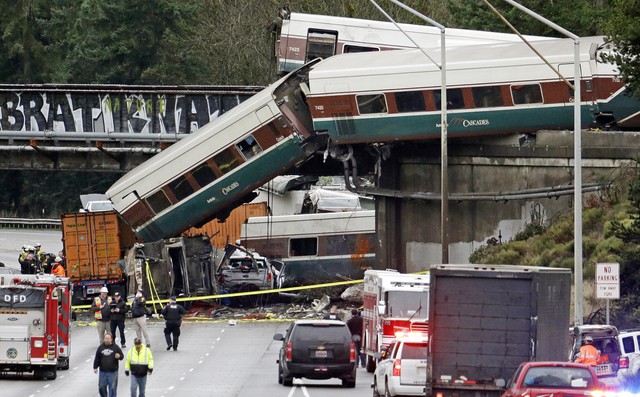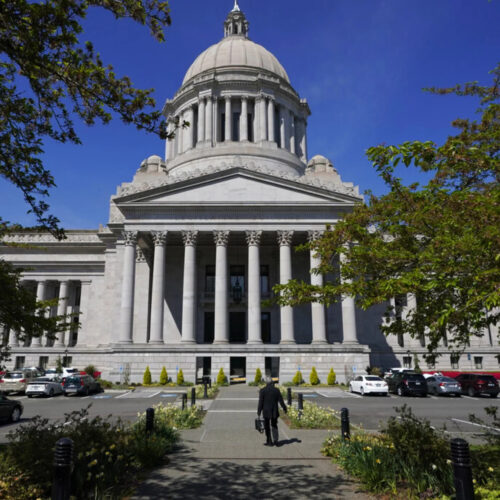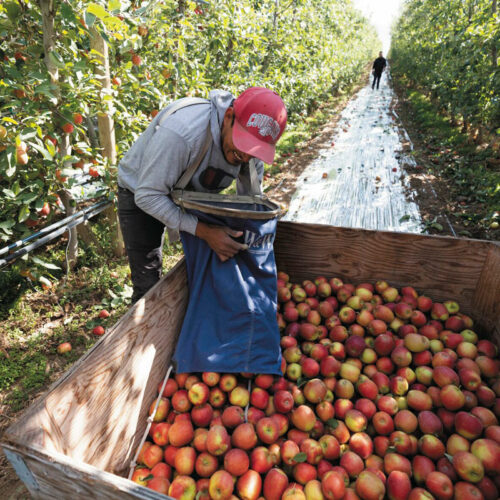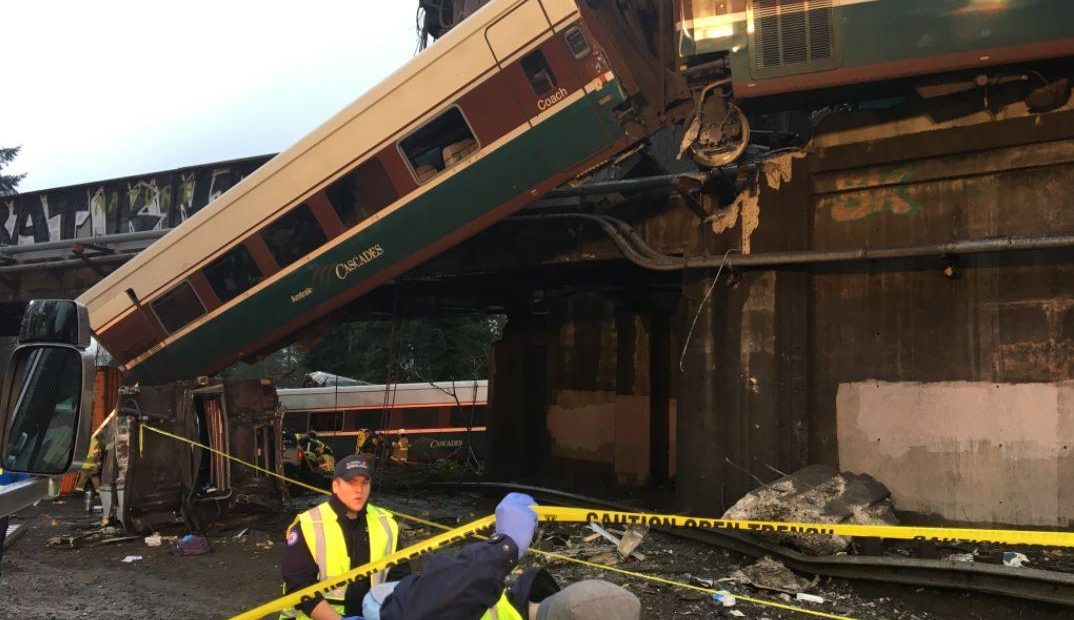
Amtrak Concedes Negligence In Deadly 2017 Derailment Over I-5 Near Tacoma
Listen
The first of what could be many trials stemming from the deadly 2017 derailment of a Portland-bound Amtrak Cascades train began with the railway accepting liability for the crash.
“We’re here because Amtrak was negligent,” attorney Mark Landman told the jury in his opening statement at the federal courthouse in Tacoma, Washington, on Tuesday. “It never should have happened.”
The crash on Dec. 18, 2017, killed three passengers and injured 65 others, including people on board the speeding train and motorists on adjacent Interstate 5.
Amtrak’s Landman asserted the only question the jury would need to wrestle with is “what is fair and reasonable compensation.”
For the first case to go to trial, the federal court consolidated the personal injury claims brought by two rail passengers and a motorist on I-5, all of whom were badly injured when the train tumbled off a freeway overpass.
In a joint opening statement, two attorneys for the derailment victims said they will seek “full accountability” for the permanent disabilities their clients suffered.
“If you break something, you have to fix it, replace it, repair it and take responsibility for it,” said David Beninger, an attorney for the plaintiffs. “The law is the same.”
The jury trial in front of Judge Benjamin Settle in U.S. District Court is scheduled to go for about eight days. The witness list makes it likely the trial will revolve around the derailment victims’ injuries and recoveries.
Plaintiffs Dale Skyllingstad, Aaron Harris and Blaine Wilmotte walked in and out of the courtroom without any obvious difficulties or limps. However, Beninger said his team would present expert medical testimony that all three have lasting emotional and physical impairments due to the derailment that will affect the rest of their lives.
“They look pretty good,” Beninger told the jury, before adding, “You can’t judge a book by its cover.”
On the morning in December 2017, Skyllingstad of Seattle boarded the train with a group of other rail enthusiasts with the goal of experiencing and documenting the inaugural run of Amtrak Cascades service on a new, faster routing to Portland. He was ejected from his compartment when the train ran off the tracks, suffering traumatic brain injury, a broken neck, broken hip and back injuries.
Harris also suffered a brain injury and multiple broken bones. The young, aspiring entrepreneur has moved back to his native New England and resumed working, according to Beninger’s account, but “his wings are permanently clipped.”
The third plaintiff, professional welder Wilmotte, is suing together with his wife, Madison. Blaine Wilmotte was commuting southbound on I-5 to a worksite with his boss on the morning of the derailment. The Ford pickup truck in which they were driving was completely mangled when it collided with a rail car that tumbled onto the freeway.
Madison tenderly patted her husband on the shoulder as he looked on glumly while their attorney showed the courtroom a video of the welder being extricated from the crushed pickup cab, in excrutiating pain, by a phalanx of firefighters and police.
All of the plaintiffs are seeking damages for injuries and loss of income in an amount to be determined by the eight jurors.
In total, more than 35 people have sued Amtrak for damages stemming from the derailment. At least one case involving an injured technician for train maker Talgo already has settled under terms that were kept private.
A final investigation report released by the National Transportation Safety Board earlier this year found the wreck could have been prevented. The immediate cause of the derailment was that the locomotive engineer failed to slow the train ahead of a sharp curve, but the NTSB cited crew training deficiencies and numerous other risk mitigation steps that the board said Amtrak, track owner Sound Transit and the Washington State Department of Transportation should have taken.
The deadly derailment happened on what was to be the first day of more frequent Amtrak service between Seattle and Portland. Washington state was all set to subsidize six daily roundtrips — up from four — using the new, faster bypass route south of Tacoma.
Last month, Ron Pate, rail division director for WSDOT, told public radio that the ratcheted-back service will remain on the older, congested routing along the Puget Sound shoreline until his agency and Amtrak can acquire replacement train sets that meet the latest safety standards.
Pate said there also is more work to do to convince the communities on the bypass route — chiefly Lakewood and DuPont — that a resumption of faster train trips can be operated safely. The number of outstanding issues made Pate unwilling to specify a date for when passenger-carrying Amtrak Cascades trains would return to the line where the 2017 derailment occurred.
Related Stories:
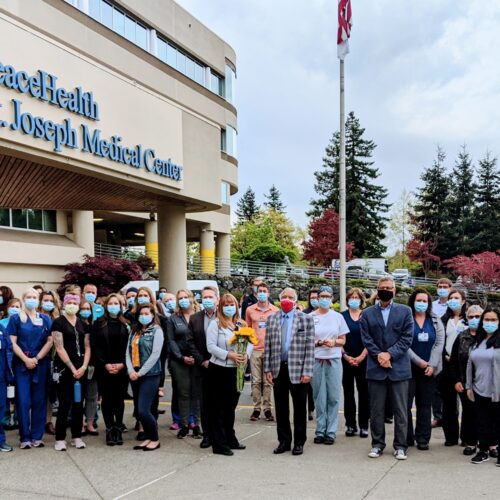
Workers at PeaceHealth feel their access to health care is limited with new insurer
When employees at PeaceHealth hospitals around the state need a prescription filled for themselves or a family member, they can get them filled at PeaceHealth pharmacies for lower costs. It’s one of the benefits of the health care organization’s insurance plan for its employees.
But in Bellingham, Washington, PeaceHealth workers can’t use that benefit. There isn’t a physical PeaceHealth pharmacy in the city.
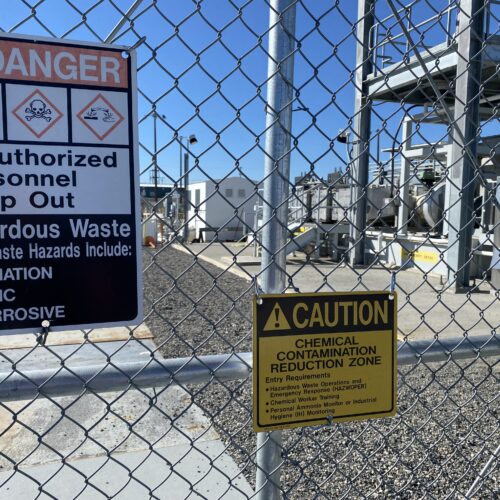
Project 2025 and Hanford: What Trump’s second term could mean for WA’s toxic sludge
A gate and signs stand guard at one of the Hanford site’s tank farms. (Credit: Anna King / NWPB) Listen (Runtime 4:02) Read By Anna King and Jeanie Lindsay Traffic

Preparing your Northwest garden for spring
Washington State University Extension has tips to help make sure your garden is ready this spring. (Credit: Washington State University Extension) Read In the dark days of winter, it’s never

